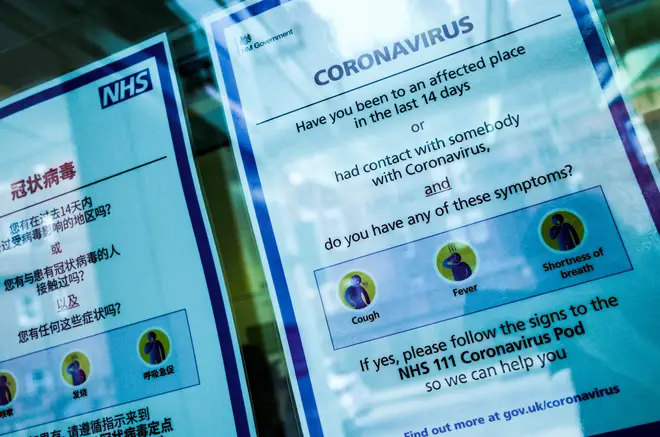
Shelagh Fogarty 1pm - 4pm
17 March 2020, 00:31

Around 250,000 people will die in Britain as a result of the coronavirus outbreak unless more draconian measures are adopted to protect the population, scientists have warned.
The Imperial College Covid-19 response team - which has been advising ministers - said that even with the "social distancing" plans set out by the Government, the health system will be "overwhelmed many times over".
In its latest report, it said the only "viable strategy" is a Chinese-style policy of "suppression" involving the social distancing of the entire population.
It said such measures would need to be maintained potentially for 18 months or more until an effective vaccine became available.
The stark warning came after Boris Johnson unveiled unprecedented peacetime measures to try to control the spread of coronavirus pandemic.
In the first of his daily No 10 press conferences, the Prime Minister called on people to stay away from pubs, clubs and theatres and to avoid all non-essential contacts and travel.
The Department of Health and Social Care later tweeted: "We advise against people using public transport, particularly during rush hour."
New #coronavirus advice:
— Department of Health and Social Care (@DHSCgovuk) March 16, 2020
▶️ Where possible, we encourage people to work from home.
We strongly advise this for people aged 70 and over, pregnant women, or anyone with underlying health conditions. pic.twitter.com/4qLpRvLeZR
Anyone living in a household with somebody who has the symptoms of a persistent cough or fever was told to isolate themselves for 14 days.
Special guidance will be issued by the NHS for the 1.4 million people most at risk from the disease - including the elderly with underlying health conditions - on further measures they need to take to "shield" themselves from it.
Mr Johnson said the measures were needed at the UK was approaching the "fast growth part of the upward curve" in the number of cases.
"Without drastic action, cases could double every five or six days," he said.
However, the Imperial College report warned that even with such a dramatic closing down of normal life, the surge capacity limits of health systems of both the UK and the US - which is adopting similar measures - were likely to be "exceeded many times over".
"In the most effective mitigation strategy examined, which leads to a single, relatively short epidemic (case isolation, household quarantine and social distancing of the elderly), the surge limits for both general ward and ICU (intensive care unit) beds would be exceeded by at least eight-fold under the more optimistic scenario for critical care requirements that we examined," it said.
"In addition, even if all patients were able to be treated, we predict there would still be in the order of 250,000 deaths in GB, and 1.1-1.2 million in the US."
The report said there was now no alternative but to move to a policy of total "suppression" involving the social distancing of the entire population, home isolation of cases and household quarantine of their family members.
Even then, it said that it was "not at all certain" that the strategy would succeed in the long term.
"The social and economic effects of the measures which are needed to achieve this policy goal will be profound," it said.
"No public health intervention with such disruptive effects on society has been previously attempted for such a long duration of time. How populations and societies will respond remains unclear."
In response, a Government spokesman said that the recommendations put forward its Scientific Advisory Group for Emergencies (Sage) were in line with "best current evidence".
"This is a very fast-moving situation. In order to give the most robust scientific advice Sage draws upon and considers a range of evidence and views to reach its recommendations," the spokesman said.
"Part of this evidence includes the latest modelling data from a number of experts. All Sage recommendations are in line with the best current evidence. We will be publishing further evidence shortly."
The Imperial College report said it had only reached its conclusions in the last few days based on experience in Italy and the UK.
At his news conference Mr Johnson said everyone needed to "stop non-essential contact with other and to stop all unnecessary travel".
By the weekend, groups particularly vulnerable to Covid-19 will be asked to stay at home for 12 weeks to ensure they are "largely shielded from social contact", he said.
He acknowledged the measures represented a "very substantial change" in the way the Government was asking people to live their lives.
"I don't think there has really been anything like it in peacetime," he said. "And we have to accept that it is a very considerable psychological, behavioural change that we're asking you, we're asking the public, the nation to do.
"But I have absolutely no doubt that we can do it, that we can do it together."
The Government's chief scientific adviser Sir Patrick Vallance insisted the measures would have a "big effect" on the spread of the virus.
"This is not a series of small interventions. You would anticipate that this could have a dramatic effect to reduce the peak and to reduce death rates," he said.
"This is a matter for us to take accountability to make sure we help each other, protect ourselves and protect the NHS."
However the chief medical officer for England, Professor Chris Whitty, acknowledged the measures would need to be in place for a "prolonged period".
"This is going to go on for some time. We should not be under any illusions that if we just do this for a couple of weeks that is sufficient," he said.